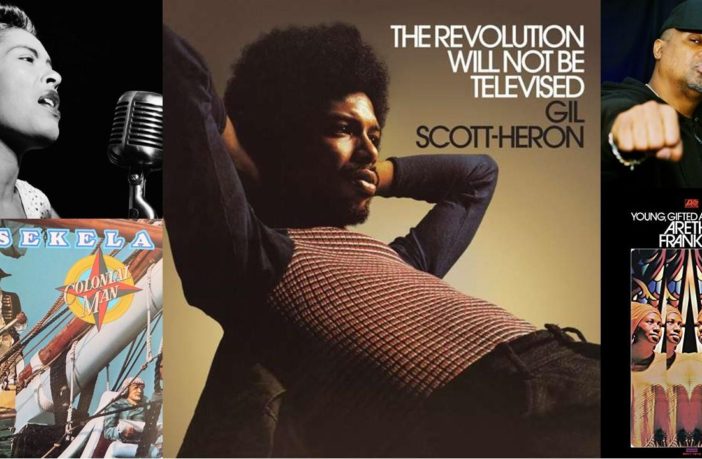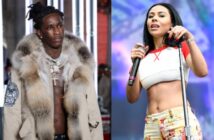The Civil Rights Movement of the late 1950s and early 60s transformed into the Black Power Movement between 1966 and 1968. This “new” movement had zero Fs to give about what whitefolk thought about us and gave even less of a damn about white sanction and approval of the tactics we employed to build the world we wanted and deserved.
Blackfolk in the Black Power Movement held the position, “What kind of ju-ju-the-fool do we have to be to allow the people oppressing us to then have the authority to tell us which methods of our protest are approved or not?”
Hence, the Black Power Movement was about Blackfolk centering our issues, our concerns and our priorities; white opinions, white concerns and white tears be damned.
But to reduce the Black Power Movement to the late 1960s and early 70s, though accurate on some measures, is to miss the simmering embers that burned before that time and continue to burn within our communities, hearts and minds for a world where we have the audacity to center ourselves rather than being satisfied with non-melanated folk relegating us to mere supporting actors in our own lives.
Thus, when thinking about the top Black Power songs of all time, it is impossible to limit the choices to music produced between 1968 and 1972. Because though the movement faded, it never died. And the flames of Black Power ideals continue to rise up periodically in songs, seemingly out of nowhere, to remind us of our divine right to dignity, power and self-determination.
Here are those top sings (from my perspective), in no certain order:
Lift Ev’ry Voice and Sing; John & James Weldon Johnson, 1900 – C’mon now. It’s the Black National Anthem. Nuff said.
Worth His Weight in Gold (Rally Round); Steel Pulse, 1982 – One of the hypest beginnings of a song ever. Then, it jumps into this smooth groove that just flows. But it’s the words of this song that take it over the top. I mean, it’s a song about Marcus Garvey and the flag he created—the Red, the Black and the Green. And this song, like so many African and Caribbean nations’ flags did, adds the gold, to the Red, the Black and the Green—representing gold and other resources found in abundance in the Motherland.
Don’t miss out! Get top Black headlines in Houston/Texas/America in your inbox Monday-Saturday.
Black Steel in the Hour of Chaos; Public Enemy, 1988 – Considered by some (especially me) as the greatest hip-hop song of all time, “Black Steel in the Hour of Chaos” has many reasons it’s on this list. First, it samples a break from one of the greatest jams from one of the Blackest performers in history; Black Moses himself, Isaac Hayes and his hit song “Hyperbolicsyllabicsesquedalymistic.” Second, this song hearkens back to the days when MCs would take the listener on a storytelling journey. The entire song is one six-minute and 24 second story—and bangin’ from start to finish. Third, that story is about a prison break; breaking free from the Prison Industrial Complex. Fourth, it’s not only a story, but a powerful piece of social commentary at the PIC and society, in general. Fifth, the words of this Black Power anthem are delivered by “The Hard Rhymer,” Public Enemy’s front-man, Chuck D. Sixth, the song has one of the best opening lines to a song ever: “I got a letter from the government the other day. I opened and read it. It said they were suckas.” Seventh, this jam is full of some of the most memorable lines in history: “They wanted me for their army or whatever. Picture me giving a damn, I said never.” “I gotta get out, but that thought was thought before. I contemplated the plan on the cell floor.” “I’m on a tier where no tear should ever fall.” “As I ventured into the courtyard, followed by 52 brothers bruised, battered and scarred but hard.” And so many more. And finally, what hook is more haunting and more powerful than “Death row, what a brotha know.”
Fight the Power; Public Enemy, 1989 – The fact that PE released this jam on the Fourth of July, 1989, tells you all you need to know. This is all about protesting, standing up for our rights and issuing a call to Black Power action. Why? Because “Elvis was a hero to most, but here never meant sh*t to me you see, straight up racist. The sucka was simple and plain. Muthaf*ck him and John Wayne.”
Fight the Power; The Isley Brothers, 1975 – Even while the Black Power Movement proper (1968-1972) was fading from memory, the Isley Brothers offered this anthem to let folk know the struggle continues. And they make the case for this song being on the list, better than I ever could, with their own words: “I try to play my music. They say my music’s too loud. I try talking about it, I got the big run-around. And when I roll with the punches, I get knocked on the ground by all this bullsh*it goin’ down.” And as Chuck D mentioned in his PBS documentary appropriately titled “Fight the Power: How Hip Hop Changed the World,” that Isley Brothers jam rocked ever hood on the planet.
Umi Says; Mos Def, 1999 – “I want Black people to be free, to be free, to be free. Want my people to be free, to be free, to be free.”
Keep Your Head to the Sky; Earth, Wind & Fire, 1973 – Black Power is all about being able to see beyond the “right now” and onto the “not yet” with elevated, divine expectations. This song, and many other EW&F songs, speaks exactly to those things.
What’s Going On?; Marvin Gaye, 1971 – You already know.
To Be Young, Gifted and Black; Nina Simone, 1969/1970 [Donny Hathaway, 1970; Aretha Franklin, 1972] – Regardless of which version is your personal favorite, each rendition brought the same powerfully uplifting message: to hell with what believers in the myth of white supremacy want us to believe, we know for a fact that we are young, gifted and Black.
Mississippi Goddamn; Nina Simone, 1964 – This Black Power song right here is why L-Boogie (Lauren Hill) said she wanted to be “like Nina Simone, defecating on the microphone.”
Am I Black Enough For You; Billy Paul, 1972 – The title says it all. We had come so far… from being ashamed to be called Black, to striving to be the Blackest version of our selves possible.
A Change is Gonna Come, Sam Cooke, 1963/1964 – Yes, it is Sam. As long as we answer the call in each generation.
Keep on Pushing; The Impressions (Curtis Mayfield), 1964 – It’s near impossible to hear this song and not get fired up and moved to… “Keep on Pushing!”
White Man’s Got a God Complex; The Last Poets, 1971 – Hip Hop before hip hop, with a message before “The Message.”
Black People What Y’all Gon’ Do; The Last Poets, 1971 – The Last Poets didn’t just call out folk and institutions that abused Black people, they called us out, as well. But what they really sought to do was call us up! Up to the plate to get busy with saving ourselves.
The Revolution Will Not be Televised; Gil Scott-Heron; 1971 – There is no Black Power list without this classic.
A Love Supreme; John Coltrane, 1964/1965 – There’s a reason why jazz is considered the most revolutionary of all forms of music. And Coltrane was/is at the top of the heap, with “A Love Supreme” leading the way.
Say it Loud – I’m Black and I’m Proud; James Brown, 1968 – One of the most memorable Black Power songs ever. Don’t believe me? The next time you’re in a crowd of Blackfolk, I dare you to shout “SAY IT LOUD…” Because you know, as well as I do, someone, if not everyone, will respond “I’M BLACK AND I’M PROUD!”
Biko; Sweet Honey in the Rock, 1988 – Steve Biko was all about Black Power. Sweet Honey in the Rock is all about Black Power. So, this song just makes too much sense for this list.
You Must Learn; Boogie Down Productions, 1989 – An entire college course could be taught just off the lyrics of this classic which called for us to self-educate in order to elevate.
Colonial Man; Hugh Masekela, 1976 – One of the dopest jams ever. The music, the message, the everything. This is the jam that inspired Shuri to tell Agent Ross, “Don’t scare me like that colonizer.”
War; Bob Marley and the Wailers, 1976 – This would have made my list go GP even before I found out that the lyrics are literally taken from a speech by Ethiopia’s Emperor Haile Selassie while he was in exile in London. His excellency was addressing the British Parliament and speaking truth to power unflinchingly when he said “Until the philosophy which holds one race superior and another inferior is finally and permanently discredited and abandoned, everywhere is war.”
Crazy Baldheads; Bob Marley, 1976 – Marley is literally talking about chasing colonizers out of town.
Exodus; Bob Marley and the Wailers, 1977 – “Movement of Jah people!”
Ain’t No Stoppin’ Us Now; McFadden & Whitehead, 1979 – Black people, “We’re on the move; we’ve got the groove.”
Get Up, Stand Up; Bob Marley, 1973 – Check the title, money.
Strange Fruit; Billie Holiday, 1939 – Not only were the lyrics statements of Black Power—exposing white domestic terrorism for all to see even when the “powers that be” didn’t want it seen—the fact that Holiday regularly sang this under the threat of imprisonment, makes her commitment to this song a truly extraordinary Black Power movement.
Heed the Words of the Brother; X-Clan, 1990 – In truth, almost any song from X-Clan’s “To the East Blackwards” album could have been on this list. But how can we not have the song that begins, “Exist in a state of van-glorious, as we are protected by the Red, the Black and the Green.”
Support the Defender
Our pledge is to elevate solutions, share successes, and amplify the experiences of Black people. We cannot do it alone.



